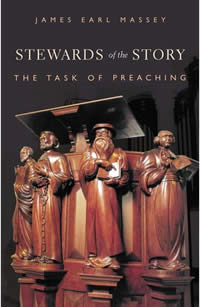Book Reviews—The Priority and Task of Preaching
John Cheeseman. The Priority of Preaching. Edinburgh: The Banner of Truth Trust, 2006. 27 pp. $2.00/paperback.
(Review copy courtesy of Banner of Truth) Purchase: Banner of Truth, CBD
Purchase: Banner of Truth, CBD
Special features: [listing of 38 other booklets in the series from Banner of Truth Trust]
ISBNs: 9780851519456 / 08151519458
LCCN: BV4211.3
DCN: 251
John Cheeseman was ordained to the Christian ministry in 1976. He has served as Vicar of Holy Trinity, Eastbourne, since 2001; and is the author of Saving Grace published by Banner of Truth. He is also a Church Society Trust Director.

James Earl Massey. Stewards of The Story: The Task of Preaching. First edition. Louisville, Kentucky: Westminster John Knox Press, 2006. 108 pages. $16.95/paperback.
(Review copy courtesy of Westminster John Knox Press)
 Purchase: WJK Press, CBD
Purchase: WJK Press, CBD
Special features: [Endnotes, Scripture Index, and a Names Index including persons, titles, and organizations.]
ISBNs: 9780664229818 / 0664229816
LCCN: BV4211.3 .M27
DCN: 251
James Earl Massey is Dean Emeritus and Distinguished Professor-at-Large at Anderson University School of Theology in Anderson, Indiana. He is a Life Trustee of Asbury Theological Seminary and has served on the editorial boards of Christianity Today, Leadership, Preaching, and The New Interpreter’s Bible. Massey’s several books include The Responsible Pulpit, Designing the Sermon, The Burdensome Joy of Preaching, and Sundays in the Tuskegee Chapel.
Subject: Preaching
What do two small books on preaching by an Anglican vicar in Britain and by an African-American educator of the Church of God (Anderson) have in common? The covers perhaps give a hint to the common perspective both books share. John Knox is prominently displayed on both! Cheeseman’s booklet has a reproduction of Sir David Wilkie’s painting John Knox preaching before the Lords of the Congregation while Massey’s has a photograph of the pulpit in Beeson Divinity Chapel featuring John Chrysostom, Jan Hus, John Knox, and George Whitefield. Both books would side with John Knox that we need as preachers to “assert that God has revealed himself to mankind” (Cheeseman, p. 6). With that as the starting point and with both authors covering the fundamental tasks of the preaching ministry, one still finds two very different books, primarily because both are book forms of earlier material.
The Priority of Preaching by John Cheeseman is a revision of a magazine article published by Churchman, an Anglican quarterly in 1999. This article can be found in their archives through Google. The content change is insignificant. The booklet tries to answer the basic “why” and “how” of preaching. Obviously, Cheeseman does not answer exhaustively in a 27-page booklet but gives what he must feel are the high points of his preaching philosophy. Although I did not find the booklet exciting because of its brevity, it is solid. It did leave me wishing that Cheeseman had expanded on his earlier article.
In three chapters, Cheeseman addresses the need for preaching today, the preparation and delivery of a sermon, and the character of the preacher himself. The back cover suggests the use of this booklet as an excellent primer for young men who believe God may be calling them to preach. Certainly, this would not be a bad book to give to a young man with interest in preaching, but if I really wanted to help a young man who is starting out, a number of other books would make most of the same points with more extended arguments. They would also cover some areas that could hardly be touched on in 27 pages. I suspect Cheeseman himself felt the frustration of not being able to say more in the space allowed when he recommended reading Spurgeon’s chapter on the use of the voice in Lectures to My Students.
The biblical arguments could easily have been expanded. Cheeseman mentions that the New Testament words imply a “strong note of authority and proclamation” (p. 5), but his explanation of the significance of these words is left to a quote from Edmund Clowney’s Preaching and Biblical Theology (Tyndale Press) that simply gives examples of non-authoritative communication methods but leaves us with no authority for his basic premise on the implications of these words. Perhaps even less supported are historical arguments made without citation from some authority. At least, he tells the fledgling preacher what the words are, and this can be looked up and investigated easily. However, when he states, “The decadent periods (of church history) have always been those in which the preaching of God’s word has been in decline,” my inclination is to agree with him, but I do not know on what grounds he is making this statement. He makes the statement without any corroboration.
Two other booklets deal with preaching in this series. It would be interesting to compare what Dr. Albert Mohler and A.N. Martin would do with this subject in a booklet.
Massey’s Stewards of the Story is certainly a more satisfying coverage of much the same material. His fifth book on preaching is an expanded version of the Conger Lectures on Biblical Preaching delivered at Beeson Divinity School (Birmingham, AL) in February 2004. The chapters taken from the lectures are followed by six sermons that are intended to demonstrate the principles made in the lectures. Massey’s work, though by no means exhaustive, gives enough good fodder for one to plan on coming back and reading him again.
The title gives us the basic premise of the book. Preachers of the gospel are stewards of the gospel story. Massey begins by defining the word “steward,” especially in the context of 1 Corinthians 4:1-2. He himself acknowledges that there is more to say on just that word than he has time to say but then does an excellent job of making the point and supporting his point scripturally and anecdotally.
The other four chapters deal with a specific area of the stewardship God gives the preacher. The second chapter, “The Steward as Recitalist,” treats extensively “The Story”, showing the preeminence of the gospel story in every part and genre of the Scriptures, especially in the Old Testament. “The Story” is an expression “from the Black Church tradition and it gathers up all that we see in the biblical message, but with special focus on the life and ministry of Jesus” (p. xv). The six expository and textual sermons demonstrate well this emphasis of Massey on “The Story.” They are solidly evangelical and make their way each time to Jesus Christ in a meaningful way.
He then takes a chapter each to speak to rhetoric, ritual, and reality. Rhetoric and reality cover the same general subjects as the second two chapters of Cheeseman’s book, but the chapter on ritual is a significant difference. Ritual has sign value according to Massey. He uses the better dress of black slave preachers to illustrate this idea. “The different distinctive dress was a declaration of devotion; it established a mood and pointed to a higher order than the routine” (p. 36). He appeals to the priestly attire in the Old Testament among other things for support of this point. He also writes about the importance of other types of ritual as well as the danger of ritual.
The highlight of the book, however, is the stories and books and people to whom he refers. When he talks about people, they come alive. When he tells a story, one pays closer attention. And when he mentions a book or lecture, he whets the desire to read that book or author. Fortunately, the endnotes are extensive and the names’ index is helpful in finding what was said by or about some of the great preachers of the past. For example, Massey’s buildup to a worthwhile quote from Elizabeth Achtemeier aroused curiosity about her book, and his reference to C. Silvester Horne’s death provoked me to do a bit of Googling about him. He is well-read but knows how to excite the reader about what he has read.
Massey’s book is the one I would give to a young preacher if given the choice between the two. It would be referred to years later while Cheeseman’s booklet may remain on the shelf.
 Robert Talley is pastor of the Fellowship Bible Church (Castleton, VT). He and his wife, Dawn, have two children. They served 11 years in church planting in German-speaking Europe (Munich, the Austrian Alps, and East Berlin) through Baptist Mid-Missions (Cleveland, OH). Robert is currently working on a Master of Ministry degree from Temple Baptist Seminary (Chattanooga, TN). Robert Talley is pastor of the Fellowship Bible Church (Castleton, VT). He and his wife, Dawn, have two children. They served 11 years in church planting in German-speaking Europe (Munich, the Austrian Alps, and East Berlin) through Baptist Mid-Missions (Cleveland, OH). Robert is currently working on a Master of Ministry degree from Temple Baptist Seminary (Chattanooga, TN). |
- 4 views


Discussion